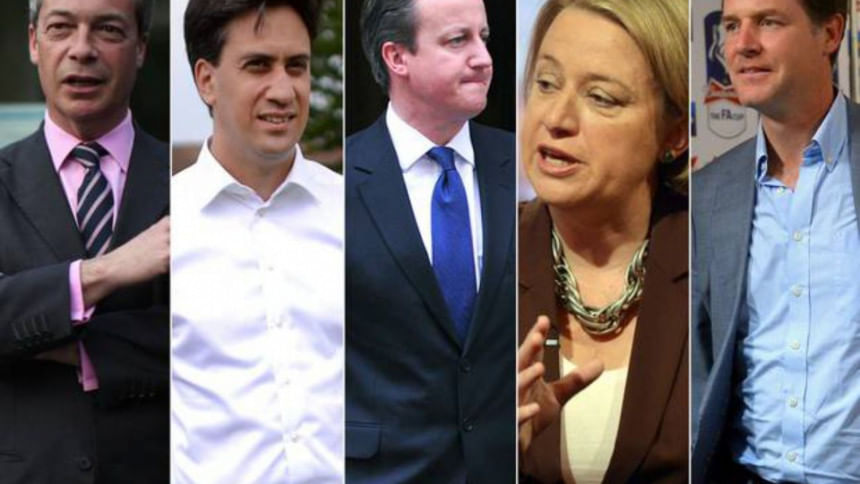Britain heading for a HUNG PARLIAMENT AGAIN

BRITAIN goes to polls on May 7, 2015 to elect its 56th Parliament -- new House of Commons. More than 3,900 candidates are in the fray, seeking votes from 45 million voters. Though the 55th Parliament was dissolved on March 30, 2015, the government of Prime Minister David Cameron will continue in office till the new House meets on May 18, 2015 and a new Leader of the House is elected. Leaders of political parties are currently busy with hectic election campaigning.
Though Britain has many parties, it has a bipolar political system and the contest is essentially between the two major parties -- Conservatives and Labour. The Labour Party is currently led by Edward "Ed" Miliband, former Secretary of State for Energy and Climate Change. As in the past, the campaign has brought forth several issues, which are of interest to the voters. Party leaders have released their manifestoes and took part in television debates to woo voters.
Britain's economy has done better than most EU economies. During 2014 the growth rate was 2.8 percent. Public sector deficit forecast for 2014-15 is £90.2 billion. Borrowing has become essential to fund public services. Both the Conservatives and Labour have promised to eliminate the deficit by the end of the 56th Parliament. Unemployment rate has come down to 5.7 percent (2014). Here too both have pledged to create new jobs. Inflation is down to 0.3 percent (Jan 2015) and wages have been rising faster (1.4 percent weekly average) than inflation. Both the parties have promised not to raise tax, but their approach is different on how to implement the existing tax regime.
Cameron, while campaigning on the economy, complained that he inherited a "disaster" from Gordon Brown in 2010. He claimed that the economy was doing much better now under the coalition government. Miliband retorted saying that the Tories were looking after the wealthy and not the lower income groups. Tories emphasise "economic competence", while the Labour stresses "making my family better off".
When the 2008 recession hit the Western economies, immigration became a hotly debated issue in Britain as unemployment rose significantly. Both the Conservatives and Labour have pledged strict control over EU and other migrants. The issue of refugees and asylum seekers entering Europe has become a big worry for Britain as hundreds of people perished on board at the Mediterranean while crossing illegally from North Africa. The problem of terrorists entering Britain has added a new dimension to the immigration problem. It is simultaneously a moral and security issue.
All the parties have been talking about strict border control and refusing benefits to unskilled newcomers. The anti-immigrant issue is contributing to the growing popularity of nationalist sentiments. Britain, along with other Western countries, has contributed to destabilising the Middle East and destroying the livelihood of millions. Many are seeking refuge in Europe from the wars in the Middle East.
Britain's National Health Service (NHS) is an extremely sensitive issue, particularly for the elder citizens. Over the decades with the number of patients increasing, staff shortages and insufficient resources – the debate for reorganising the NHS has become stronger. Both the Conservatives and Labour have promised billions of pounds and pledged to integrate health and social care services.
Education is also important for the younger voters. Lib Dems could not stop university tuition fees from increasing which prompted protests in 2010. Lib Dems and Labour are now talking of protecting the education budget against rises in inflation, while the Tories are being accused of cutting school funding.
Since the 2008 recession, the debate over EU membership has become an important element in British politics. Britain never joined the "Euro" zone, the common currency which is in deep trouble. It has caused economic collapse in a number of EU member countries, led to mass unemployment and deep recession. David Cameron wants a referendum on Britain's renegotiated membership by 2017. He is strongly against joining the Euro zone. Labour wants a guarantee that there would be no further transfer of power from Britain to EU without a referendum. Most Britons favour leaving the EU. The question that remains unclear – will Britain be economically more powerful after leaving the EU?
Among the foreign policy issues facing Britain, the challenges are – the Iran Nuclear Deal, stemming the flood of asylum seekers from North Africa,
They also support the two-nation plan and see that the situation in occupied Palestine does not deteriorate after Benyamin Netanyahu's election victory, conclude the Transatlantic Trade and Investment Agreement (TTIA) with US, and how to deal with rising China. Neither the Conservative nor the Labour have come out with any specific stand on these issues.
According to the latest opinion polls conducted by BBC and the Economist both the Conservatives and Labour are running neck to neck, with 34% and 33% respectively. What is new is the relegation of Lib Dems from third position to fourth with 8%. The United Kingdom Independent Party (UKIP) has gone up in popular rating to third position with 14%.
Projections are that the Tories and Labour will get more than 300 seats each, but not an outright majority to form the next government. It will be a hung parliament requiring flexibility among the parties in the House to join either of the larger parties to form the next government. It will be the second time in post WWII that a coalition government is formed in Britain.
Interestingly to form a government one or more smaller parties will conveniently bend their ideological moorings and join either the Tories or Labour and get past the 326-seat threshold. Which party/parties will be the king maker and who will occupy No. 10 Downing Street will be clear after May 7.
The writer is former Ambassador and Secretary

 For all latest news, follow The Daily Star's Google News channel.
For all latest news, follow The Daily Star's Google News channel. 



Comments